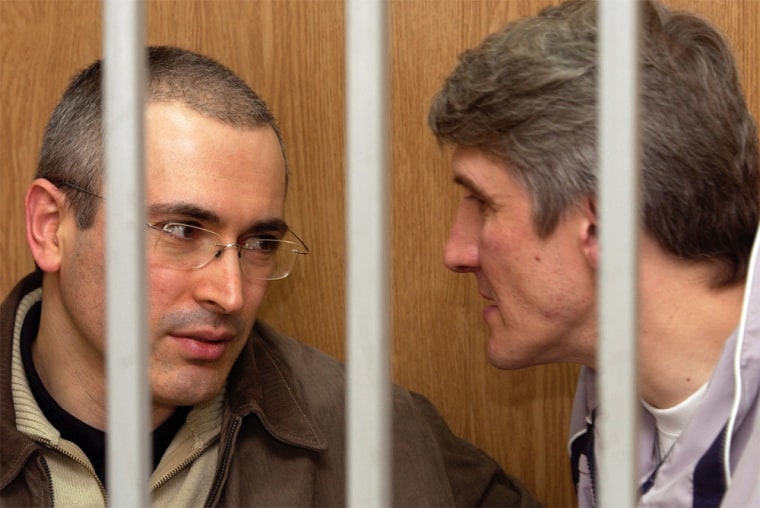Russia’s richest man and a major shareholder of his former oil company went on trial Wednesday — confined in a metal cage — on fraud, embezzlement and tax evasion charges that supporters say are politically motivated by the Kremlin.
Former Yukos oil company CEO Mikhail Khodorkovsky exchanged glances and sometimes a comforting smile with his elderly parents, Marina and Boris. He also chatted warmly with co-defendant Platon Lebedev inside the cage in Meschchansky district court.
“Everything is OK, you can see for yourselves,” Khodorkovsky told Associated Press Television through the bars. Speaking of Lebedev, he said: “We haven’t seen each other for almost a year. Now we have a chance to talk — about everything, but mostly our families.”
Privatization of fertilizer plant at heart of case
The trial of the two billionaires, largely in connection with the 1994 privatization of a big, state-owned fertilizer plant, will delve into the murky privatization process that accompanied the dismantling of this ex-Communist state. Both could face about 10 years in prison if convicted.
The company that made them their fortune, Yukos, is reeling from its own legal troubles. Facing a $3.4 billion tax claim it says it can’t pay up front, the company has warned it might be driven into bankruptcy.
Yukos’ stock price tumbled 8 percent Tuesday as investors panicked on news that Yukos managers were trying to strike a deal with the government on paying off the tax claim if it is ruled legal in a court hearing Friday. Yukos shares fell more than 3 percent on Wednesday.
Later in the day, the Interfax news agency quoted a spokesman for Group Menatep, the holding company through which Khodorkovsky and Lebedev control Yukos, as saying it was ready to help the oil company pay the tax claim if it is forced to do so.
“I am expecting nothing more than I’ve seen in the past,” Robert Amsterdam, Khodorkovsky’s Toronto-based lawyer, said outside court. “This is a country that destroys its finest company while its senior members languish in jail illegally.”
10 reporters allowed to witness proceedings
Journalists massed outside, alongside a group of young Yukos supporters wearing red T-shirts with Khodorkovsky’s portrait on the back. Only about 10 reporters were allowed into the proceedings, which were held in a small, poorly ventilated courtroom. At one point, a recess was called because the room was too hot and stuffy.
Khodorkovsky appeared calm throughout the proceedings; Lebedev was more impatient and emotional.
Judge Irina Kolesnikova agreed to a defense request to hear only procedural issues until Khodorkovsky’s main lawyer, Genrikh Padva, recovers from eye surgery. Padva was not in court and the defense team said he was not expected back until Monday.
President Vladimir Putin has portrayed the nearly yearlong investigation into Yukos and its shareholders as part of Russia’s effort to tackle economic crime and corruption. But the targeting of Khodorkovsky at a time when he was raising his political profile in opposition to Putin has led many analysts to suggest that the Kremlin wants to destroy a potential challenger.
Some foreign investors and Russia’s other multimillionaires fear the investigation is also an attempt by the government to reclaim some of the natural resources and enterprises sold off in the 1990s, or at least ensure they are run by Kremlin-friendly business executives.
Investment pledge unfulfilled, prosecutors say
Prosecutors claim that in 1994, Lebedev and other officials of Group Menatep won a 20 percent stake in Apatit, Russia’s largest manufacturer of a key fertilizer component, through a scheme involving fake bidders. The bidder, which won the Apatit shares for a nominal price, never fulfilled its pledge to invest $283 million in the company, they say.
According to the charges, Khodorkovsky masterminded the fraud.
The Apatit deal was one of the so-called loans-for-shares deals in which the government sold prized assets for nominal sums to those who made the highest investment pledges.
Besides the privatization fraud, prosecutors claim both men dodged corporate and personal taxes and siphoned off profits from Apatit.
Khodorkovsky and Lebedev have denied the charges.
Lebedev has been jailed since July; Khodorkovsky since October. The court Wednesday rejected a request by Lebedev’s lawyers to release him from jail, Russian media reported, despite an emotional address in which the defendant lamented his separation from his children and grandchildren.
“The prosecutors’ claims do not contain any proof that I could make an attempt to escape or put pressure on witnesses,” said Khodorkovsky, urging the court to place him under house arrest. Judges have repeatedly refused to free the two.
